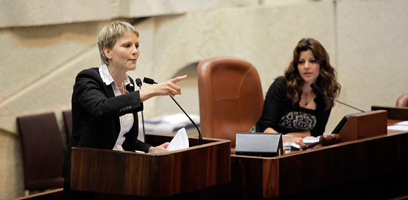
A bill proposing to restrict the noise made by mosques will be up for discussion at the Ministerial Committee on Legislative Affairs on Sunday.
The proposal aims to prohibit mosques from sounding the nighttime and early morning calls of the Muezzin – who uses a public address system to beckon worshipers to pray – in order to avoid disrupting nearby residents. As per the initiative, the interior minister will be able to determine which mosques could sound the call and when.
Related stories:
The bill bases its premise on a study conducted by the Knesset Information and Research Center, which surveyed the clash between the freedom of religion and resident's rights. The study observed a rise in the number of complaints filed by residents of Jaffa, Haifa, Ramle and other cities over the disruptive noise and the lack of volume regulation.

Al-Omari Mosque, Ramle (Photo: Ziv Reinstein)
"The freedom of religion shouldn't compromise quality of life," Anastassia Michaeli (Yisrael Beiteinu) and a group of her fellow MKs wrote in the proposal.
'Bill direct affront on Islam'
According to the Knesset report, there are some 400 mosques in Israel, half of which are manned by state-employed clerics, and whose public address systems are under state regulation. The rest are not under government supervision.
Moreover, the study surveyed other countries' policies on the issue, and found that the Muezzin calls in Egypt are synchronized, and their volume is monitored. In Saudi Arabia, public address system use has been restricted as well. In Austria, the Muezzin sounds his voice only Vienna's Islamic Center, and only on Fridays.

MK Anastassia Michaeli (Photo: Noam Moskovich)
Officials in the Arab sector lamented that the initiative is a direct affront to Islam.
"Those who come live in Jaffa are aware of the mosques and churches here," Sheikh Saliman Setel said. He noted that a few minutes of the Muezzin call does not compare to the noise that comes from traffic, police cars and ambulances.
Tel Aviv Councilman Ahmad Mashharawi equated the bill to a rash of legislation that has been promoted by the Right-wing Knesset members in recent weeks, and accused the lawmakers of being so "drunk on power they are willing to compromise the foundations on which the state was based."
"Islam was here before Anastassia Michaeli came to this country, and it will stay long after she's gone," he said.
- Receive Ynetnews updates
directly to your desktop















